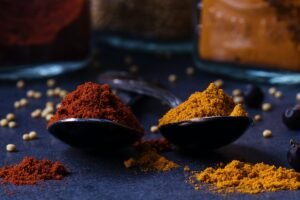Health Benefits of Rhubarb
This perennial vegetable is jam packed with Vitamin A, Vitamin B6, Vitamin C, Vitamin K, anthocyanins, anthraquinones, beta-carotene, dietary fibre, folate, lutein, lycopene, magnesium, niacin, pantothenic acid, poly-phenolic anti-oxidants, riboflavin, thiamin and zeaxanthin
WELLNESS
This stalky veggie is often overlooked in the produce aisle, when it is, in fact, a powerhouse food in its own right, with a plethora of important health benefits including but not limited to
Cancer prevention Some studies show that polyphenols may help destroy cancer cells – leukemia cells, in particular. Vitamin A protects the body against lung cancer and oral cavity cancer. Beta-carotene shows promise against breast cancer. Vitamin K fights off liver and prostate cancer. Lycopene has also been shown to lower the risk of prostate cancer.
Bone and teeth health Vitamin K promotes strong bone formation. Vitamin C plays an important role in repairing bones. Vitamin C is essential for healthy gums. Vitamin A and beta-carotene are crucial for a strong set of chompers, too
Brain health Vitamin K decreases neuronal damage in the brain and thus can help in the treatment of Alzheimer’s disease
Depression Beta-carotene can alleviate the symptoms of depression
Digestive health Anthraquinones have laxative abilities and fibre can also ease constipation
Eye health Vitamin A, Vitamin C, lutein and zeaxanthin are all highly regarded eye antioxidants that promote higher visual acuity and can prevent cataracts and age-related macular degeneration
Heart health Vitamin K assists with proper blood clotting. Vitamin C can lower cholesterol and fight atherosclerosis. Lycopene can stave off heart attacks by protecting the blood vessels around the heart. Magnesium regulates the heartbeat and relaxes the blood vessels. Rhubarb is a saturated fat and cholesterol free food
Immune system health Vitamin C bolsters the immune system, protects against the common cold and influenza, heals bruises, cuts and wounds and fights off or lessens the symptoms of innumerable infectious diseases, bacteria and viruses. Vitamin A helps maintain healthy mucous membranes
Pregnancy Folate is highly recommended by doctors for expectant mothers as it helps prevent neural tube birth defects
Stress relief Vitamin B-6 produces GABA, an amino acid, which acts as an important neurotransmitter and promotes a general calming effect and sense of well-being
BEAUTY
Anti-oxidant properties Vitamins A and C, anthocyanins and lycopene all have tremendous antioxidant abilities and champion against cell-damaging free radicals that often result in premature aging. They can preserve the integrity of your skin, add bounce and luster to your mane and keep your nails strong and resilient
WEIGHT LOSS
Nutritional intake Rhubarb is a weight loss-friendly food with one cup having only a mere 26 calories and yet a whopping 2.2 grams of fibre, which means it will fill you up without doing caloric damage to your diet
COOKING / CONSUMPTION
Look for fresh, crisp, bright red stalks (some varieties remain green) , bruise and blemish free. Do remove the leaves, as they are poisonous
Why not try Rhubarb in a Salad for something Different, mix with edamame, seaweed some toasted almonds and cranberries for a smashing flavor hit and exciting new food sensation
Rhubarb is tart and sweet in flavor and lends itself well to homemade jams and jellies, chutneys and compotes, and is especially wonderful when mixed with strawberries, raspberries or cherries
If you have never had the pleasure of a classic rhubarb pie, now is the time to make this sweet bliss happen. get your hands into some homemade dough, try using coconut or maca flour for increased health benefits, coconut or palm sugar instead of white . Just toss 1500 ml of rhubarb (trimmed of ends and cut into ¾ inch pieces) in 250 gm of sugar, 40 ml of cornstarch and a pinch of sea salt, add some star anise for a flavour punch. Pour into the pie shell and sprinkle with a crumble topping or a lattice of pre-cut pie dough. Bake in a 180c oven for about an hour and a half, or until the crust is a pale golden brown. Let cool completely before serving.
Fun fact: Rhubarb is often called the “pie plant,” as it is most commonly used to make pie.






